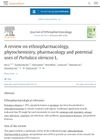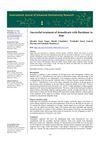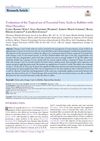 June 2024 in “Current Developments in Nutrition”
June 2024 in “Current Developments in Nutrition” Omega-3 fatty acids may not help and could harm hair loss improvement in middle-aged or elderly men.
16 citations,
October 2013 in “Irish Veterinary Journal” Oral feline interferon-omega improved symptoms in diabetic cats with gingivostomatitis.
 1 citations,
April 2019 in “Endokrynologia Polska”
1 citations,
April 2019 in “Endokrynologia Polska” Healthy diet and exercise are important for women with PCOS to manage weight and metabolic issues, and supplements like omega-3, vitamin D, and inositol may help.
[object Object] 
Eating healthy, exercising, and certain nutrients like myoinositol and omega-3s can help manage PCOS symptoms.
June 2020 in “The journal of investigative dermatology/Journal of investigative dermatology” Different diets change the fat composition in mouse skin, often reducing beneficial omega-3 fatty acids.
 February 2022 in “International journal of KIU”
February 2022 in “International journal of KIU” Certain genes and nutrients like vitamin D, zinc, and omega fatty acids affect COVID-19 severity and infection risk.
 15 citations,
January 2016 in “Przeglad Menopauzalny”
15 citations,
January 2016 in “Przeglad Menopauzalny” Eating a balanced diet with specific nutrients is important for menopausal women to manage hair loss.
 11 citations,
November 2022 in “JAMA dermatology”
11 citations,
November 2022 in “JAMA dermatology” Some nutritional supplements may help treat hair loss with generally mild side effects.
 8 citations,
September 2021 in “Journal of Cosmetic Dermatology”
8 citations,
September 2021 in “Journal of Cosmetic Dermatology” Some diets and supplements might help with skin disorders, but their effectiveness varies and more research is needed.
 7 citations,
May 2016 in “SpringerPlus”
7 citations,
May 2016 in “SpringerPlus” Some breast cancer patients on hormone therapy experience hair loss, and treatments like certain topical inhibitors and supplements may help without harming their cancer prognosis.
 6 citations,
May 2014 in “Biomarkers and Genomic Medicine”
6 citations,
May 2014 in “Biomarkers and Genomic Medicine” Charnoly bodies could be a marker for cell damage, and certain nutrients and proteins might prevent them, potentially helping with brain diseases and cancer.
 5 citations,
September 2023 in “Journal of ethnopharmacology”
5 citations,
September 2023 in “Journal of ethnopharmacology” Purslane has many health benefits and potential uses in medicine, food, and farming.
 5 citations,
January 2014 in “International journal of gynaecology and obstetrics”
5 citations,
January 2014 in “International journal of gynaecology and obstetrics” HIV-positive pregnant women are more likely to experience severe bleeding, and a pregnant woman with familial hypertriglyceridemia had a successful early delivery with special care.

research Acne
4 citations,
January 2019 Acne is a common skin condition that can be influenced by diet, lifestyle, and hormones, and requires a treatment approach that includes psychological considerations.
[object Object]  2 citations,
July 2018 in “Elsevier eBooks”
2 citations,
July 2018 in “Elsevier eBooks” Some supplements may help with hair loss, but there's not enough strong evidence to recommend them without doctor advice.
 1 citations,
January 2023
1 citations,
January 2023 Functional foods can improve hair and skin health.
 1 citations,
October 2012 in “Medical Hypotheses”
1 citations,
October 2012 in “Medical Hypotheses” The conclusion suggests that treatments targeting root causes of chronic diseases may be developed by focusing on gene expression and lifestyle factors.
 December 2024 in “Deleted Journal”
December 2024 in “Deleted Journal” Flaxseed can naturally smooth and improve hair health.
 March 2024 in “CRC Press eBooks”
March 2024 in “CRC Press eBooks” Nutraceuticals can effectively manage hormonal imbalances and related health issues.
 January 2024 in “International journal of advanced biochemistry research”
January 2024 in “International journal of advanced biochemistry research” Fluralaner effectively cured dogs with severe skin issues caused by mites.
 January 2024 in “International journal of advanced biochemistry research”
January 2024 in “International journal of advanced biochemistry research” Fluralaner successfully treated dogs with severe demodicosis in 2 months.
 June 2023 in “JAAD international”
June 2023 in “JAAD international” Patients with skin of color are more likely to use supplements for hair loss than Caucasian patients, but the effectiveness of these supplements is uncertain and they can be expensive.
 April 2023 in “JIVA : journal of Indian Veterinary Association Kerala/JIVA :Journal of Indian Veterinary Association, Kerala”
April 2023 in “JIVA : journal of Indian Veterinary Association Kerala/JIVA :Journal of Indian Veterinary Association, Kerala” The dog fully recovered one month after treatment.
Proper nutrition and vitamins can boost the immune system and overall health in older adults.
 October 2022 in “Veterinária notícias/Veterinária Notícias”
October 2022 in “Veterinária notícias/Veterinária Notícias” A 5-year-old Akita with a rare skin condition improved significantly after treatment.
 July 2022 in “Research, Society and Development”
July 2022 in “Research, Society and Development” The conclusion is that different treatments improved hair growth in dogs with Alopecia X, but results varied and not all dogs had complete hair regrowth.

Icosapent ethyl may help treat long-lasting symptoms after COVID-19.

There are many ways to treat Polycystic Ovary Syndrome, including lifestyle changes, surgery, and various medications, but more research is needed for better treatments.
 January 2021 in “Research journal for veterinary practitioners”
January 2021 in “Research journal for veterinary practitioners” The document does not determine if essential fatty acids improve rabbit skin health.
 October 2020 in “Veterinary Dermatology”
October 2020 in “Veterinary Dermatology” New treatments and diagnostic methods for various animal skin conditions showed promising results.



























